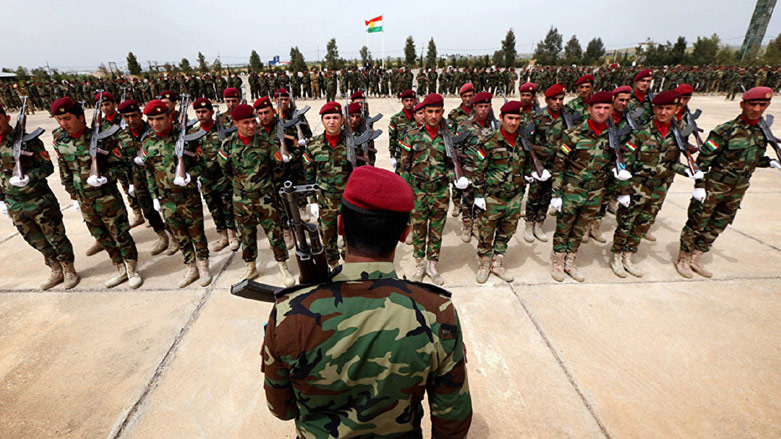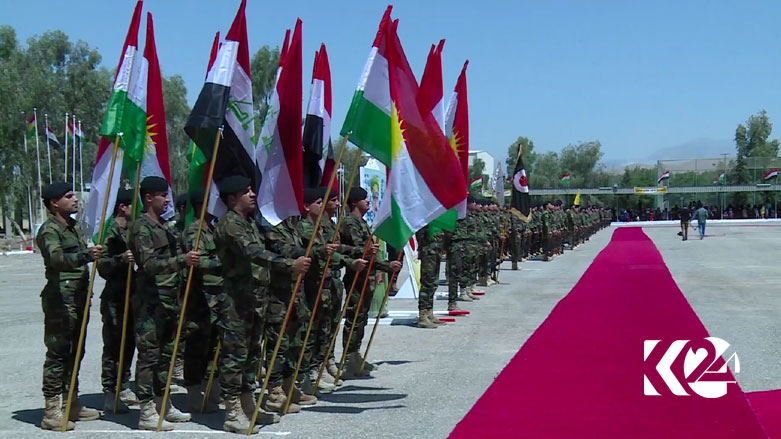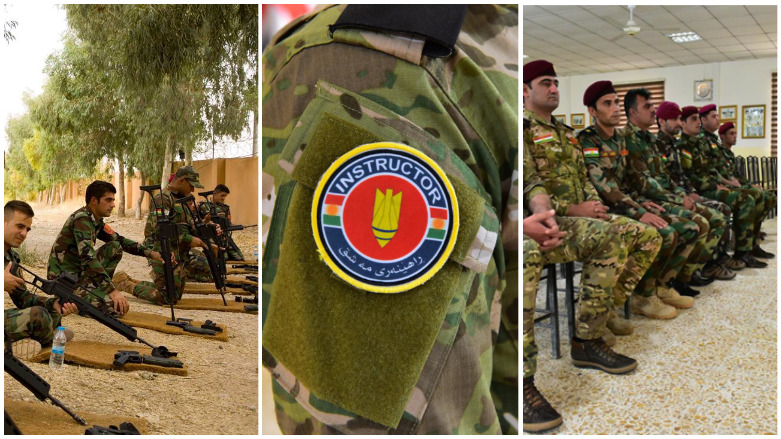Coalition message to Kurdistan Region: No change in our support

WASHINGTON DC (Kurdistan 24) - Brig. Gen. Brian Eifler, Deputy Commanding General for Erbil (DCG-E), spoke with Kurdistan 24 on Friday to explain the significance of the Coalition decision, announced on April 30, that it was deactivating the Combined Joint Forces Land Component Command (CJFLCC.)
“I just want to re-emphasize,” Eifler affirmed to Kurdistan 24, “there is no change in (our) support to the mission” in the Kurdistan Region.
“That’s the bottom line for the Kurdish people,” he continued. “We’re here to help, and the closing down of CJFLCC will not impact that.”
The relative success of the four-year war against the Islamic State (IS) has allowed the Coalition, officially known as Combined Joint Task Force-Operation Inherent Resolve (CJFT-OIR), to shift the focus of its efforts and “streamline” its mission.
CJTF-OIR is “the three-star General [Paul] Funk Corps level headquarters in Iraq,” Eifler explained. “Underneath that” was another headquarters—CJFLCC. That “was the division level—the two-star level,” and it was commanded by Maj. Gen. Walter Piatt.
It became “unnecessary to have them both,” so “we just basically combined, reduced and streamlined the effort”—that is we “consolidated the headquarters,” Eifler explained.
Eifler described CJTF-OIR’s activities in the Kurdistan Region. Generally speaking, “We’re here to make sure that we’re providing any support we can,” Eifler said. “And I’m here to make sure that the region of Kurdistan gets the support it needs from the Coalition.”
“Multiple nations” are engaged in training the Kurdish Security Forces (KSF) in order “to increase the capacity” of the Ministries of Peshmerga Affairs and of Interior, as well as the Kurdistan Region Security Council—the three organizations in the Kurdistan Region with which Eifler deals.
“We’re really working with them every day,” he said.
Asked if the Coalition was promoting reforms within the Peshmerga, including the unification of their commands, “Yes,” was Eifler’s reply. “All the countries in the multi-national effort are helping, as the ministries ask for assistance on certain things.”
“I think they have a pretty good system here, from what I’ve seen,” he added,
Asked if it was the Coalition that saw problems and then gave advice, or if the Kurdistan Regional Government (KRG) ministries identified issues and sought assistance, Eifler replied, “It’s a little bit of both.”
It’s “hard not to see something from an outside perspective,” he continued. But “they encourage that—like what do you see and how can we do this better?”
“Most of the time,” however, “they have the answers, and we try to help them,” Eifler said.
In addition, “we do some coordination.” If there is an airstrike against IS that is between the Iraqi Security Forces (ISF) and the Peshmerga, “we help deconflict that.”
“The Ministry of Peshmerga and Ministry of Interior are vital portions of the Iraqi security infrastructure,” he continued. “I stay linked in with them to make sure” that coordination happens properly.
“We also encourage the dialogue between the [KSF] and the [ISF] and continue to ease the tension.”
“In the last few months, it’s gotten a lot better,” Eifler stated. “They’re talking a little bit more, they’re working together, and I’m hopeful for what I see—less focused on each other and more focused on eliminating the remnants of Da’esh” (Arabic acronym for IS.)
Eifler explained a bit about the coordination between Erbil and Baghdad.
“A lot of it happens over the phone at the top levels of the government, especially with the Minister of Interior and Minister of Peshmerga and their counterparts down in Baghdad,” he said.
That is particularly true “as we come up to the elections”—which will be held on May 12. “Everyone wants peace, everybody wants security.”
Working together is “how they defeated Daesh and liberated the country,” he emphasized. “Peshmerga worked with the [ISF], and both sides fought valiantly together to make a better place here.”
“I’m encouraged by that,” Eifler said. “I think they can still do that.”
“As we say, it’s tougher to win the peace. You win the war and you defeat [IS], but you’ve really got to win the peace,” Eifler noted, “and that’s a little bit more challenging sometimes.”
Asked about the future, Eifler emphasized that CJTF-OIR was in Iraq at the invitation of the government of Iraq. But its work in Kurdistan would continue, as long as that remains the case or until the mission is completed.
“So while we’re here, we’ll continue to help in any way possible,” he affirmed.
BBC Monitoring published an analysis on Friday, stating that IS had “significantly stepped up attacks in Iraq recently”— in Kirkuk Province “particularly,” and in neighboring Salah al-Din Province, as well as Diyala.
As Kurdish officials have repeatedly warned, security has deteriorated since Iraq’s assault on Kirkuk and other disputed areas.
This seems only to underscore Eifler’s emphasis on the necessity for cooperation between the Peshmerga and ISF, as well as the likelihood that the Coalition will remain in Erbil for some time to come, as IS, indeed, remains a significant danger.


